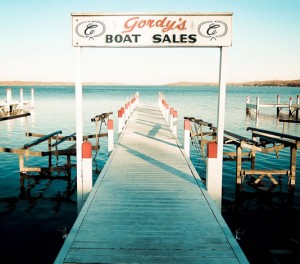So far in Part 1 and Part 2, I’ve been building up to this post. We’ve seen how important having the right boat lines is to a boat dealer and explored the relationship between the boat sales business, repairs and the manufacturer (three sides of a triangle). We’ve even dabbled a little into used boat sales. Let’s discuss secrets for boat sales survival. Drum roll, please.
Why Do Some Boat Dealers Go Out of Business?
 First, let’s rule out incompetence. If you’re a boat dealer, you’ve got a lot of specialized knowledge and experience running a boat dealership, so I don’t believe it’s an operational issue. As is obvious, the pattern is that when a recession arrives, some boat dealers don’t make it. So it’s the economy, right? Well, sort of. Yes, boaters don’t buy new boats and have fewer repairs done. The boat dealer knows this. The answer to the question of why some boat dealers go out of business has to do with how well they’ve planned for a downturn.
First, let’s rule out incompetence. If you’re a boat dealer, you’ve got a lot of specialized knowledge and experience running a boat dealership, so I don’t believe it’s an operational issue. As is obvious, the pattern is that when a recession arrives, some boat dealers don’t make it. So it’s the economy, right? Well, sort of. Yes, boaters don’t buy new boats and have fewer repairs done. The boat dealer knows this. The answer to the question of why some boat dealers go out of business has to do with how well they’ve planned for a downturn.
The Burdens of Being Weighed Down
Boat dealers go out of business because they can’t carry the cost of their sales operation. As you might guess from Part 1 of this series, their debt carrying costs are a huge factor. That $2 million dollar showroom becomes an anchor dragging down profitability during a recession.
But mortgage debt is only half the equation. The other half is floor plan inventory. Boat dealers don’t actually own their new boats. They are held on “consignment” just like a car dealership. They place an order, receive the boats and pay a percentage per month, generally around 1 percent. Those in the business call this the floor plan inventory.
Let’s say you’re a dealer and have five boats that average $200,000 in price. That’s a payment of $10,000 per month in floor plan interest. That’s not such a big deal, right? Combine that with advertising, payroll (hopefully the sales force is pure commission), utilities and other typical business costs and it’s a decent sized nut to crack. It’s not so bad when you’re selling a boat every month or two, but what happens when a year goes by without a new boat sale? Taking it further, no new boat sales means a huge drop off in warranty work for the repair division. This can be 50-60 percent of total repair revenue gone. The repair division doesn’t have staff on commission. The repair manager, the parts manager and the many highly trained and paid mechanics are a fixed cost. Now a hole has been dug and the only way to fill it is to refinance (assuming enough equity) or draw on the largest lender in a recession – hip pocket national bank (if you get my drift). Now you see why you need income from other parts of the marina like wet slip rental, dry storage, etc.
The 800 Pound Gorillas have Left the Room
The ground underneath the boat sales business shakes when the 800 pound gorillas collectively leave the room. By that I mean the floor plan lenders. You know the names – Bank of America, Key Bank and others. One day the dealer gets a phone call that their floor plan lender will no longer honor their line of credit to the dealer. They’ll give them some amount of time to come up with alternate arrangements, but after that, it’s bye-bye.
Remember who owns the boat? With a floor plan lender, it’s not the manufacturer – the lender bought the boat from the manufacturer. So if the lender isn’t collecting interest, that means either the dealer buys the inventory or it goes back to the lender. ‘Guess you know which of the two the dealer chooses. Well, there’s always used boat sales!
… And They Took the Baby Gorillas with Them!
Did I say there’s always used boat sales? Technically that’s true, but by the time all the above has happened, what’s happened to used boat financing? You got it – it sank right along with new boats. Just because you’ve got a lot of inventory of used boats doesn’t mean that they’ll move. Just ask the car dealers how well used cars are selling. Not like hotcakes, that’s for sure. There are still lenders but there are more reasons to turn down a used boat loan than to make one.
Throw the Baby Out with the Bath Water
The visibly apparent consequence of the above is that expenses get cut to the bone. ‘Nothing new there. Personnel are let go out of necessity. Mechanics are kept due to their nearly irreplaceable skills as is their manager, but everyone else is fair game.
So what happens to the marina? Obviously, no contracting for repairs gets done. Yet a talented, knowledgeable staff remains that may not be busy. Ironically, since they may have the time available, lots of little repairs get done. Docks might also get repaired or upgraded if permits are in place. You never know.
Every Cloud has a Silver Lining
So as you can see, the dealers that will survive the recession have some combination of the following:
- Deep pockets to cover losses
- Streamlined expenses
- No showrooms or inexpensive showrooms
- Diversified incomes from wet slips, dry storage, dry stack or some other real estate
- Long-standing positive repair reputations
- Debt service that does not strangulate
The difficult thing about business is that you have to cover your fixed costs. You can cut your variable expenses drastically but fixed costs that can be cut are few in number and generally small in size (except for payroll). The ironic thing in this whole affair is that most of the leverage a dealer has to survive a recession was predetermined before the recession began. Fixed costs are fixed costs, so if they’re too high and payroll has already been cut to the bone, there’s very little room to maneuver.
Like any business boat dealers need to know what their break-even is after variable expenses are slashed and payroll, the only material fixed cost that can be changed, has been minimized. Is that number greater than the net operating income with no new boat sales revenue? Is that number greater than no new or used boat sales revenues? That, my dear Watson, is the mystery.

